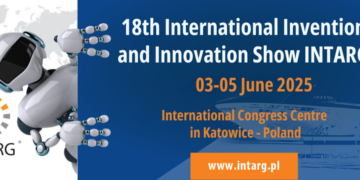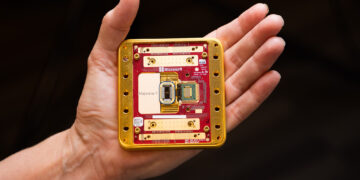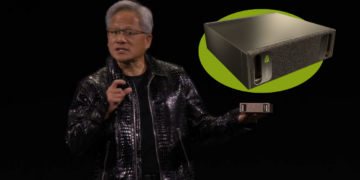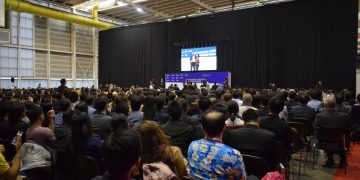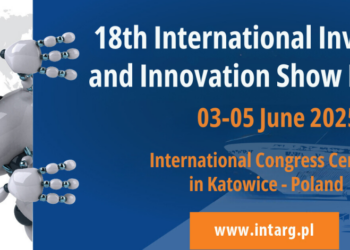In a vote of confidence in Taiwan’s role as a tech ecosystem, Advanced Micro Devices Inc. (AMD) has chosen to locate its new R & D centers in Tainan and Kaohsiung. The new facilities are part of a NT 8.64 billion dollar project to advance its development of cutting-edge technologies such as artificial intelligence (AI) and silicon photonics. AMD is the latest in a series of global semiconductor companies seeking to build their R & D centers in Taiwan under the Ministry of Economic Affairs’ A+ global R & D and innovation partnership program. The US chip company was granted a subsidy of NT 3.31 billion dollars in July, which accounts for about 38% of the company’s costs for this investment. AMD’s decision came as Taiwan has formed an extensive supply chain to provide components for the world’s AI devices, from AI chips made by TSMC to AI servers assembled by Hon Hai Precision Industry Co. and Wiwynn Corp., amongst others. AI chip giant Nvidia Corp. has set up its first AI R & D center in Taipei’s Neihu District and is scouting sites for a second, likely in Kaohsiung. Semiconductor equipment makers ASML Holding NV, Lam Research Corp. and Applied Materials Inc. previously also received grants to set up local R & D sites through the same program. Another developing trend is that, in order to expand the local tech talent, Kaohsiung has been working with the nation’s prestigious schools. At the beginning of this year, National Tsing Hua University signed a memorandum of understanding with the Kaohsiung City Government to establish a branch in the city, following a similar agreement with the National Yang Ming Chiao Tung University. It is estimated that about 33 Taiwanese companies would take part in AMD’s R & D program which would help to train more than 10,000 AI professionals each year. SEMICON Taiwan Records Largest Number of Exhibitors A record number of exhibitors attended SEMICON Taiwan, an annual international trade fair in the semiconductor fair, after it opened on September 4. The annual event featured more than 3,600 booths from over 1,100 exhibitors from home and overseas, the highest number since it was first held in 1996, according to SEMI, an organization located in Hsinchu that connects about 3,000 member companies and 1.5 million professionals worldwide to advance the technology and business of electronics design and manufacturing. This year, the theme of the event was “Empowering AI Without Limits”, and highlights the significance of silicon photonics and fan-out panel level packaging (FOPLP). A forum focusing on silicon photonics was held during the event, featuring experts from organizations and companies, including Taiwan Semiconductor Manufacturing Co. (TSMC), Inter-university Microelectronic Centre, and Marvell, for discussions regarding the opportunities and challenges facing silicon photonics. Silicon photonics, known for its high bandwidth, low power consumption, long-distance transmission, and cost-saving features, has become a hot topic in the semiconductor industry. It is estimated that the global silicon photonics market could reach US 7.86 billion dollars by 2 2030. In addition, a forum on FOPLP was also held, with experts including those from Applied Materials, Manz and Advanced Semiconductor Engineering Inc. discussing and exploring related technological developments. Driven by demand for 5G, Artificial Intelligence of Things, automotive, high-performance computing, and consumer products, FOPLP shows significant growth potential. According to research firm Yole, the market is expected to reach US 221 million dollars by 2028, with a compound annual growth rate of 32.5 percent from 2023 to 2028. CNIPA Releases Fee Information for Requesting Patent Term Adjustments and Extensions China’s National Intellectual Property Administration (CNIPA) released fee information for requesting patent term compensation and annuities for the term of any granted compensation. The announcement, dated August 6, 2024, means that CNIPA will now charge a fee of 200 RMB to process requests for patent term compensation including patent term adjustments for CNIPA delay and patent term extensions for pharmaceutical patents. Annuities during the extended period will be 8000 RMB/year. CNIPA also confirmed the 15% reduction in annuities for open licensing that was announced earlier by the Ministry of Finance and the National Development and Reform Commission. Under Chapter 5 of the Implementing Regulations of the Patent Law, patent term adjustment (PTA) must be applied for within 3 months of patent grant. For patent term extensions (PTE), patentees must request PTE within 3 months of grant of marketing authorization in China. China Releases Report on IP Developments China’s National Intellectual Property Administration released a report on August 16, 2024, about the National Intellectual Property Agency Industry Development Status. Following are some of the highlights: 1. At the end of 2023, there were 5,269 patent agencies, a year on year increase of 16.6%. 2. At the end of 2023, there were 35,712 registered trademark agencies – a year on year drop from 71,446. 3. At the end of 2023, a total of 76,230 people had obtained patent agent certificates, a year on year increase of 20.4%. 4. The number of practicing patent agents reached 34,396, a year on year increase of 9.7%. 5. 3,448 people were practicing patent agents for the first time in 2023. 6. In 2023, a total of 47,649 people registered for the examination nationwide (a decline of 8% from 51,511 in 2022), and 6,150 people passed the examination (a 12.9% pass rate versus a 46% pass rate for the US patent bar exam). 3 One notable statistic is the large drop in the number of trademark agencies. This happened because many agencies failed to reregister in 2023 under the stringent new conditions.




